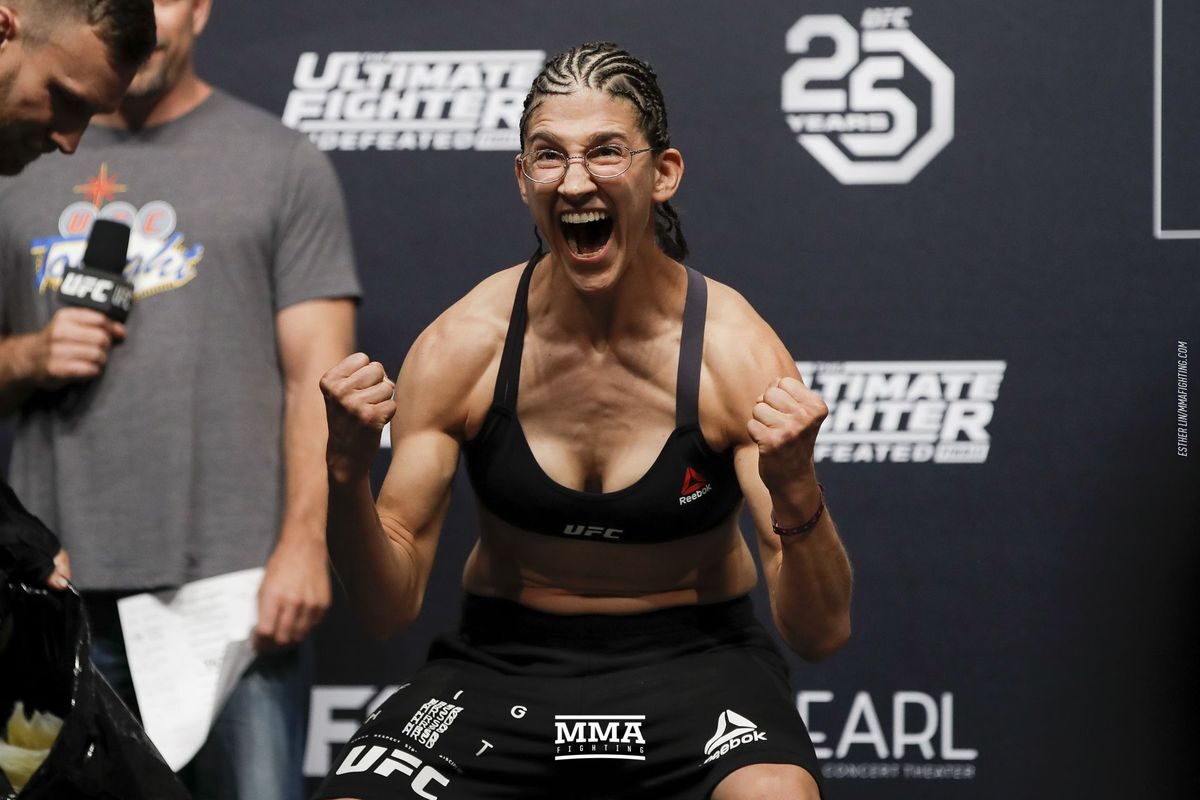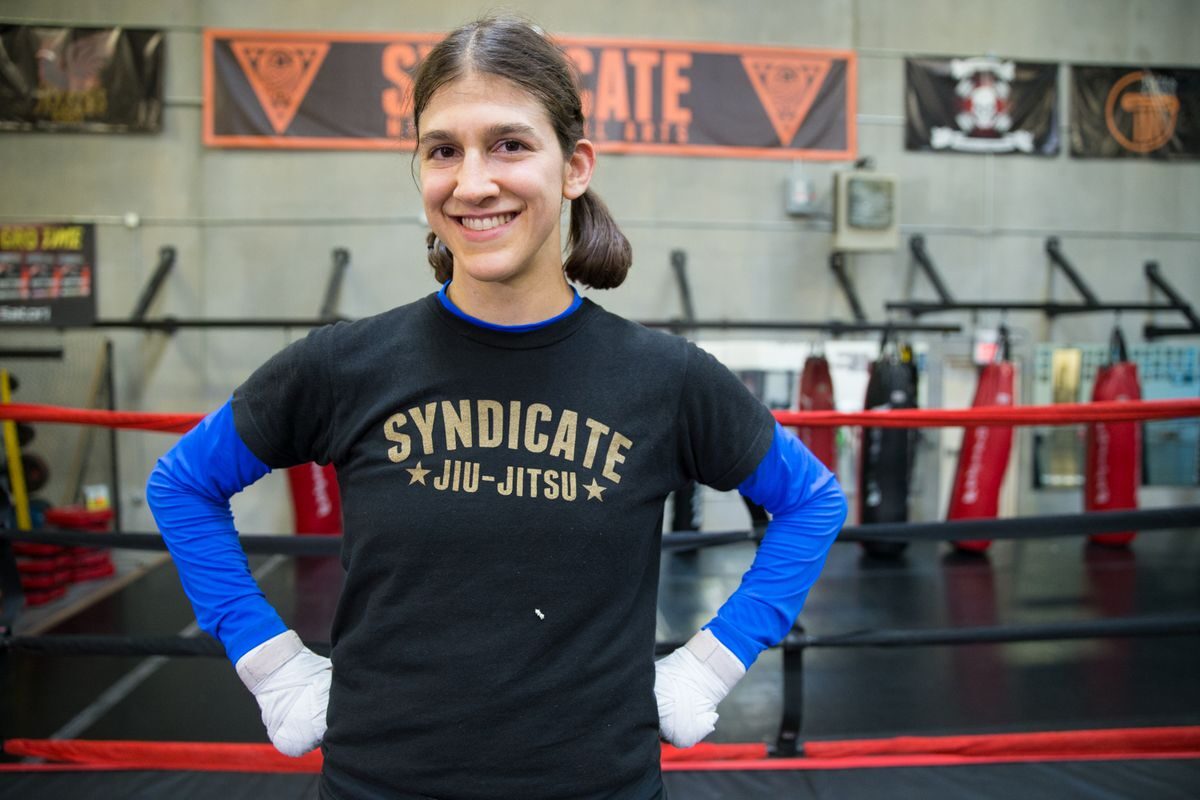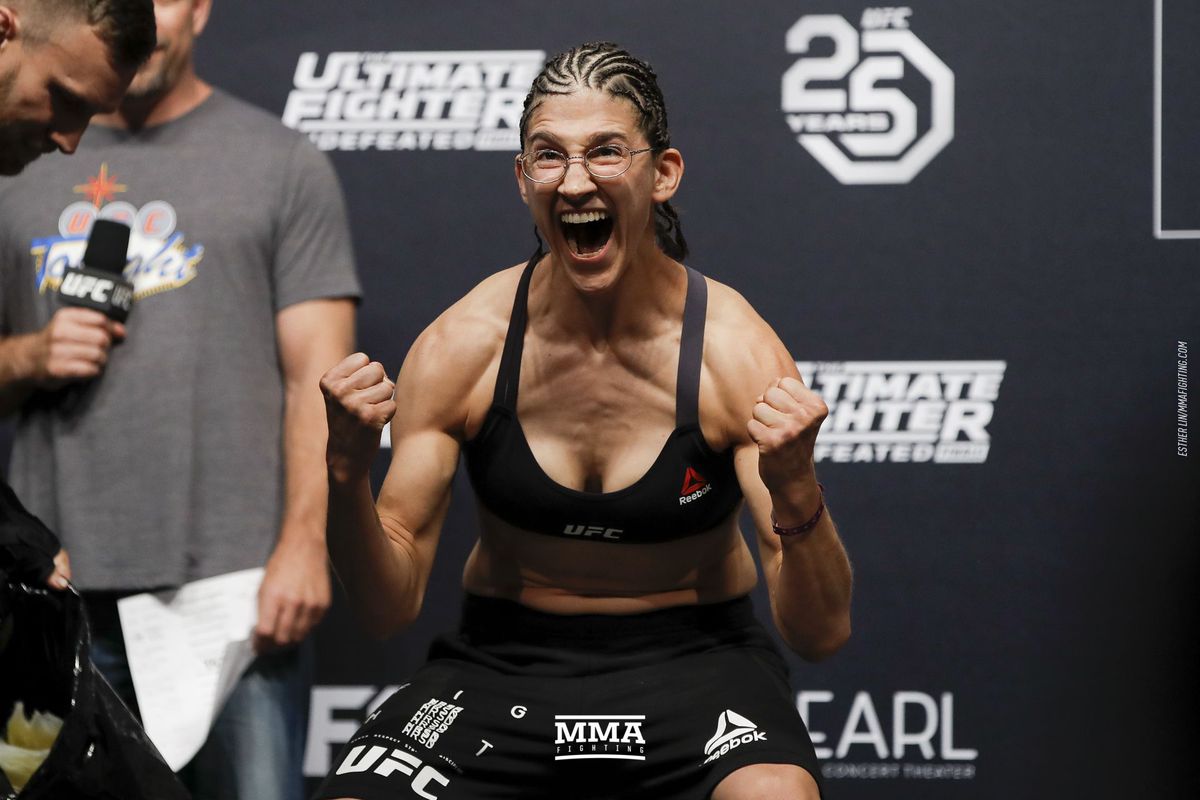The word “pioneer” gets thrown around often in mixed martial arts, but there are few more deserving of the label than Roxanne Modafferi.
After 20 years, Modafferi’s road finally comes to an end this Saturday when “The Happy Warrior” competes in her final MMA fight against Casey O’Neill at UFC 271. If you count her exhibitions on The Ultimate Fighter, it’ll be the 50th time Modafferi has made the walk — a number unrivaled by any other woman in the sport’s history.
In many ways, it’s the end of an era.
She may never have been a UFC champion, but Modafferi is one of the last links to a forgotten generation. Modafferi’s journey started in a period when women in MMA were treated with disdain. She persevered despite the odds, leaving with her place in the history of MMA. And she remained true to herself throughout. So to celebrate a true trailblazer, we called upon the fight world to share their favorite “Roxy” tales, and explain how an unassuming anime nerd defied expectations to become the last woman standing.
Editor’s note: All interviews edited for clarity and concision.
When Modafferi first laced up her gloves in 2003, opportunities for women to fight were few and far between, particularly outside of Japan. Indiana-based promotion HOOKnSHOOT was a rare exception, and when an injury to Judy Neff derailed a matchup against Jennifer Howe that was supposed to determine one of the best female fighters alive, in stepped an unknown making her stateside debut in an underdog role she’d soon come to know well.
Jeff Osborne (HOOKnSHOOT founder): At the time, the No. 1 fighter in the world was Jennifer Howe. Tara LaRosa once said that Roxanne should be put against her. Roxanne would beat her.’ So just on Tara’s word alone, I’m like, ‘Oh God, Judy Neff is out, so I’m not going to be able to put together a really big fight’ — I hadn’t seen Roxanne, but I trusted the other women fighters enough who suggested Roxanne.
So Roxanne shows up alone. Roxanne is so kind, she doesn’t care where you are, or what your surroundings look like. She’s so damn nice. I want to say I picked her up at the airport, and I immediately thought, ‘Oh my God, who is this nerdy girl standing in front of me?’ Then all the other women and people [around me] are like, ‘How could you do this and put her [in there]? You’re going to put her up against Jennifer Howe when she hasn’t been in any fights. !’ So I immediately start thinking, ‘What have I done?! I’m going to get this girl beat down.’
Tara LaRosa (MMA fighter): It was tough back then, because there are were so few women.
She and I used to run [the North American Grappling Association] back in the day, like 2001, 2002, 2003. We would go to NAGAs and she would do the upper weights and I’d do the lower weights, because I’m a weight-cutter, so I’d always cut down. We would race that crap together. She would win her division every time, while I would win mine each and every day. That’s how we got to know one another. So then naturally when Jeff was looking for somebody for Jenn Howe, I said, ‘I got your girl. I’m telling you, Roxanne Modafferi, check her out. It’s amazing. She’s badass.’ And he was like, ‘ehhh,’ something about Harry Potter, because of the glasses.
She was just so unassuming, but I knew how good she was. I was like, ‘Bro, I’m telling you, I’m telling you — this is the one. Jenn will be taken out by her. Mark my words.’
Kaitlin Young (MMA fighter, former Invicta FC matchmaker): It’s good that it’s grown into what it is now, but women’s MMA had a very, very different feel back then.
There weren’t really divisions. The money was peanuts. And even just the way it was regarded, we were often just laughed off. Many shows made us fight for three minutes instead of five rounds, which caused people to be really annoyed at seeing women in pain. Now people are so much more, ‘Well, they’re fighters,’ and it’s not a big deal. It was a source of condescension even among the general population. This was extremely annoying. Because you did not have good fights, your growth was hampered. Like some of Roxanne’s early fights were against ’45ers, or even over that. A lot of them were like that.
Shayna Baszler (MMA fighter, WWE star): It was definitely a thing where, it was more of the freak show attraction on the card whenever there was the girl fight.
It’s funny to think about now — I thought we were fighting so hard for this sport, for legitimacy in the court of public opinion, when really it was a bigger fight to show that women were fighters too, skilled fighters. We had to learn our lessons. We’d show up at a gym, and you’d have these guys in there that wanted to beat you up so bad so you didn’t show up ever again. And you kind of had to take it and shake their hand and say thank you, and then still show up the next day. It wasn’t in their mind to think that girls could have any sort of skill or be any sort of value.
Julie Kedzie (MMA fighter, Invicta FC broadcaster): They just thought we were trying to be men or we were all butch lesbians. That’s not a derogatory comment. I just meant that it was the language I was using at that moment.
Maintaining a positive attitude [through that], I mean, that’s gritty. It was necessary to be able to see the worst and most horrible things happening in this world, with a determined, open-minded eye. That’s a lot of strength of will it takes to be able to do that. And [for Roxanne] to stay the way she is? That’s something I value. That’s a truly admirable thing.
Osborne: I’ve learned a lot from her, because those are the people that I’m most afraid of on the planet now, are — it’s not the big bodybuilder, beefy, tough-looking [people]. It’s average human beings. She is anything but average. But I could tell, the crowd [at the Howe fight], as soon as Roxanne walked out, they were [fooled]. Because Jennifer Howe was very toned, very in shape. I think she had knocked out a bunch of women and she may have been 12-0. The crowd was a WWE squash match. The crowd thought that this girl would be murdered.
So the fight happens, and I’m like, ‘Oh my God, she’s going to die. She’s going to die.’ But then Roxanne wins the fight! And of course, I look like magic, because the Harry Potter girl [did it]. They immediately want to rematch me, and I am like, “Oh, God.” This isn’t going to go [well]. The rematch isn’t going to go well, because now Jennifer Howe knows what she’s getting.’ And then Roxanne triangles her — triangles her unconscious — the next time they fight. Like, holy crap.
You just knew something big just happened. The girl who beat Jennifer Howe is now going to be a household name to us in MMA. I couldn’t believe it.

Esther Lin, MMA Fighting
Young: I know you know this, but fighters are all a bunch of nerds. You’re all animal-loving, nerds. We all still attempt to be tough to some extent. Roxanne, I don’t think, gives a single f*ck about that. She never did, I think.
Baszler: If you talked to all of us [of that era], there was kind of this — yes, technique, and yes, we trained, and yes, we were serious, but in everybody there was kind of this down-and-dirty streak in them still. There was that “I’ll f*ck up” attitude. And there was zero of that with Roxanne.
Culturally, you could tell she acted a little bit different. She wanted to honor her instructors, and she took that very serious. And she was very Naruto in the way she was like, ‘I must show what I have learned to improve.’ There was never any of that [anger or resentment] with Roxanne, so it’s understandable to see why she was constantly underestimated.
Marloes Coenen (MMA fighter): She was always so genuine, so happy, so kind, to the point that, in the beginning, in the early years, I didn’t trust it — which tells you more about me than it does about Roxanne. I said, “I don’t buy your happy act.” Like, ‘Nah, nah, nah.’
I was very standoffish and cold, still polite, but it was very obvious I didn’t want to be friends — and she kept on being nice. And that made me really feel really bad.
Osborne: I don’t know if you’re old enough — a lot of people aren’t — to remember ‘Sesame Street,’ where they put up four squares and one of them was not like the other? She was more than an asset to not only my show, but the whole entire industry all together. Roxanne is a person, and you can’t hate her. I’m sorry, but if you hate Roxanne, you’re an asshole. If you hate Roxanne Modafferi, I won’t be able to trust you. If someone I knew hated Roxanne Modafferi, I don’t want anything to do with that human being, because there’s something wrong with them.
So she was quite possibly the best, most well-spoken ambassador a person could have for women’s MMA [in the early days]. Roxanne was not a [critic] looking outside, but someone who sees the sport as brutal and barbaric, could say, “Oh my God, Roxanne is so evil!” I think they would be shocked at Roxanne’s honesty and openness.
Coenen: I remember when we were fighting in Strikeforce, we were in the same overflow hotel. You know, you have the hotel where all the fighters are, and when there was a surplus of fighters, they’d get to a different hotel. She was in the same hallway as me, had jetlag and was still living with her family in Japan. And she was like, ‘Yeah, no, I woke up at like 2 a.m. and I couldn’t sleep.’
And I just remember being like, ‘Wait…why are you telling me this?! Because we’re going to fight each other, I should not have this information!’ [Laughs.]
But now I’ve learned that this is just who Roxanne is. She’s wonderful.
Sarah Kaufman (MMA fighter): We fought, actually, it was pretty close to where I live. It was in Washington, Everett, and I literally had quite a large group of people bused down from Victoria. It was [Strikeforce] title fight, it was nearby, so like 40 people might have come down on this big bus. And after [Modafferi lost via slam knockout], they were all at the hotel and Roxy was at the same hotel — and she actually took pictures with all of my crew, who were so excited to meet her.
She still, after the fight, took the time to take photos with them and sat and talked with them and say hello and be herself, which was super cool. It’s not something that everyone will do, particularly with the victor and his little entourage. That while she lost, she could still take that loss and still [be there] for the fans and the people.
Julianna Pena (UFC champion, TUF 18 winner): She’s everybody’s cheerleader.
I didn’t have anybody I could confide in [on The Ultimate Fighter 18], because it was being projected from our team that [TUF 18 coach Miesha Tate] was favoring me, and that because we knew each other, that she was giving me extra help, and she didn’t want to be perceived as someone who was picking favorites. And so I literally had no one. My coaches were not available to me, and I was unable to talk with them. It was almost like I was all by myself. So my only person that I could talk to was Roxanne, and she helped me get ready.
She was the only one that believed in me. She was the only one that was helping me and giving me that extra added like, ‘You can do it. I believe in you.’
Baszler: The day after our fight, I had an extra day before my flight left. So I ended up beating her — I just caught her in the Shayna wing, chicken wing sort of [submission] — and the venue was small enough that I could hear her yelling and [getting really upset at herself] in locker room at the end.
But then she came and literally asked if I’d like to go check out Japan the next day.
The whole next day, she took me all over sightseeing to these temples and to these toy stores, these like six-story action figure stores, going out to eat. It’s one of my most favorite memories from Japan. Rox is the only one who can do that. She loses a fight to this up-and-comer at the time — my name only just started getting talked about, and she was definitely talked about in the top two or three people in the world at the time — but still she was so awesome to me the next day. There were never hard feelings.
Pena: That’s what I was waiting for — I’m like, nobody is this nice. You don’t see this every day. You know, it’s impossible to keep up with this. And there’s got to be a point where this person is just not this person. This is a façade.
But living with her for six, seven weeks, it wasn’t. Roxanne was just nice through and through, heart of gold, and just a joyful person to be around at all times.
So it was so amazing, when I won to get to the [TUF] finale, the first person I went and hugged was Roxanne — and we both hugged each other, we were bawling our eyes out, crying. She was just so excited, and she was like, ‘This is what we worked on! We worked on this move!! ‘ Because I remember leading up to the fight, we worked on only that specific move for the entire week, and so when I hit that guillotine, that was the move that we had been working on — and she was the one that was getting choked the whole time. And she was just so happy that it worked.
LaRosa: When we fought, I forget how the first round went — it was pretty even, we knocked the sh*t out of each other, it was fun — and the round ended. She came, she followed me back to my corner and sort of bent down, like kind of got in my face — and she [screamed], ‘You better not be going easy on me because we’re friends!’
I was like, ‘Oh…oh my God! She’s not being hit hard enough. Sh*t! Oh my God!’ [Laughs.] Like, who does that? She thought that I was hitting her hard enough.
So the third round, we’re on the ground again and it’s toward the end of the round. I must’ve had mount, and I swung for the armbar — and I’ve got this. It’s all there. I’m getting ready to just lift my hips, because I’ve got her stretched out — and somebody rang the bell or did something. It was like a whistle or something, so I let go, because it’s the end of the round, I thought. The ref said, “No! That’s not it!” That’s just 10 seconds!’ And so — I’m dead serious — Roxanne lays back down and gives me her arm between my legs.
Dude. You mean, what’s the fuss? I couldn’t finish the armbar, so it went to judges, but that whole thing — that’s Roxanne. It’s like her. She is real. She is the truth. And I get it. In her world, it would’ve been bullsh*t if she’d taken the arm and gotten out because of some technicality that had nothing to do either one of us. It’s who she is. She is a genuine human being.

Esther Lin, MMA Fighting
LaRosa: I’ve got to tell you, when she told me — like when she texted me and she told me this is it, this was her last fight — it made me cry. And I don’t cry.
Coenen: We have this very one-dimensional view, actually, of what fighting is and what you have to be. But I love when I see fighters who are outside of that box. They talk about how vulnerable they are and how their mental game is, or, ‘Yeah, I’m know I’m not the strongest,’ not having this tough [act] and not having feelings or anything, you know? And she really helped a lot of people to see themselves differently and to see fighters differently. To be [active] so long in a game at this level, she changed the perspective people had on fighters. That’s perhaps her greatest contribution to the sport.
Kedzie: I think she changed the face of the sport, just by quietly persevering.
I mean, she is the one who, out of all of us, stuck with it and evolved. She is an example of those times when everyone was left behind or were second-class citizens. I tweeted something about this the other night, just like, ‘How far women’s MMA has come,’ and she’s a callback to that. In so many ways, her journey represents the evolution of women’s MMA.
Baszler: What’s even crazier to think about is when you put it in perspective. I’ve always described Roxy as like, you don’t look at her and [think], ‘Wow, she is an athlete.’ You know what I mean? She wouldn’t be offended by me saying it. But I had a coach once outside of MMA who always said natural ability isn’t a measure of how much success you’re going have, it’s just a measure of how many reps you’re going to have to get in before you get that success. And I think the thing about Roxy is, Ronda [Rousey], it might have taken her five reps to learn this new thing; Roxanne’s got to do it maybe 25 times. And these are just [fictional] numbers, but she will sit there for as long as it takes for her to become adept at that. It’s been so difficult for her to do this, but she is now a pro at it.
And yet she’s still in there and she’s still competing at a very high level. So I hope people are able to finally wrap their head around what an achievement that is.
Young: Not only the longevity of her career, but the late evolution of it was so cool. I think there’s something we all can learn from her, and what a resurgence she had. Sometimes fighters think that if they aren’t hitting their potential, then they won’t succeed. Whereas, I think that’s erroneous.
Roxanne was the best Roxanne we ever saw in her last few [years]. And she was over 30 fights in when that started happening. So there’s something to be learned there.
Pena: Fifty fights. Holy smokes, can you imagine? Literally, 50 fights. I don’t know of any other woman that has more fights than that. That’s incredible.
I never have [met anyone like her in the fight game], and I suspect I never will. Roxanne is an exception. Roxanne is an exceptional person and a unique experience.
LaRosa: She is the last of us. She is the last of all the OGs. This is because she fought before us all, and it’s in her blood. It is her spirit. This is what she does.
And I am so proud of her. She’s amazing. After all the time, she’s still in the UFC.
You’ve got to love it and you’ve got to want it, and you’ve got to live it and give yourself to it wholeheartedly. Roxanne gave her all to the sport. Roxanne embodies the spirit of the warrior. She did not care about who she was fighting. She refused to turn down fights. She did not pick or cherry-pick and was open to all. It was about herself and self-growth and the new stuff she could learn. Roxanne was constantly learning and growing. When you look at Roxanne, that’s how you should be. That’s what you strive for.
Baszler: It’s just fitting that she’s the last one of us left. It’s hard to find a better explanation.
Like when it gets down to the core of everything, does it all just boil down to fighting in the cage? It has to amount to more than that, right? I’m talking like a big picture of life, getting a little philosophical, I guess. But she’s really taken that to heart. She’s a great martial artist. And I think you can argue that she’s not the best fighter today or something, but she is the best martial artist that there is out there today, for sure. That when you get to know her and you watch her, she is definitely someone you point at to show all the fighters you’re teaching: That’s how you should be.
Kedzie: From when female fighters were not allowed to fight, from when all you could do is find jiu-jitsu competitions, to fighting Howe as a last-minute replacement, and nobody believed she’d beat her, and then she beat her again — wow, what a career. It was an inspiring career. There’s nobody who’s more of a pioneer in this sport than Roxanne Modafferi, to me. Her doors were opened, but she did not open them shouting or blasting inappropriate statements. She opened the doors quietly and didn’t move. That’s quite inspirational. It’s kind of the career, in so many ways, I wish I had.
An era has passed, and it’s an era I was fortunate to be a part of, but also I don’t think I’m in any way the person that defines that era. I think if anyone defines that era, it’s Roxanne.


